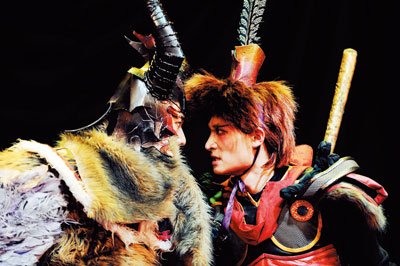 Cao Zhen caozhen0806@126.com THE Third Shenzhen Urban Drama Festival, featuring 16 stage works from Shenzhen, Taiwan, Hong Kong and other Chinese cities, will run at Nanshan Cultural and Sports Center from April to June. The full schedule can be found at the organizer’s website juooo.com. In its third year, the festival has gone from strength to strength with more Shenzhen-based troupes and a variety of stage art (kunqu, Beijing opera and mime). Directors and actors are striking a balance between attracting today’s audience and sticking to their styles by displaying new thinking and new attitudes in their works. They believe the festival is an endeavor to support independent drama directors, and also to convince audience members that low-budget dramas focusing on contemporary society and human nature are gaining more attention in Shenzhen. Shenzhen Simple Play Troupe’s Mandarin play “White Stone” centers on young migrants living in Baishizhou, one of Shenzhen’s iconic urban villages. Director Yang Juanfu said this play is not an inspirational portrayal of migrants’ rising to be well-off but a focus on what they lose in the modern city or how urbanization affects human feelings. “Urban villages, as an open space, are part of Shenzhen’s migration identity. My play is neither experimental nor avant-garde. I’m using traditional drama techniques in telling stories to reflect life in Baishizhou,” said Yang. Also focusing on Shenzhen’s migration nature, director Chen Qichong’s “Exploding Toilet” also sets on urban villages but his drama is in Cantonese, the widely used dialect in Guangdong but rarely heard in Shenzhen. “I’m a Shenzhen native. I grew up speaking Cantonese, watching Cantonese TV and listening to Cantonese songs but now Shenzhen children don’t speak Cantonese. I’m also forgetting some Cantonese slang. This is terrible,” said Chen. Keenly aware of the decline of Cantonese, Chen began thinking seriously about preserving Cantonese by integrating the dialect with modern theater. The 27-year-old Shenzhen University performance graduate hopes Shenzhen doesn’t lose its roots while embracing other cultures. “I want to do something for Cantonese dialect. ‘Exploding Toilet’ is a comedy. I hope audience members learn Cantonese with laughter.” Apart from original plays, adaptations from the classics are also a highlight of the festival. A Mandarin adaptation of U.S. one-act play “Line” will present audience members an absurd resonation of “being first in anything” in human behavior. Written by Israel Horovitz in 1967, it is an absurdist drama about five people waiting in line for an event. It was never made clear what the event is. Several of the characters’ stated expectations contradict the others. The characters use their wiles in an attempt to be first in line, getting more and more vicious as the play continues. The play is the longest-running play in Manhattan and the longest-running Off-Broadway show on the boards, having played continuously at the 13th Street Repertory Theater since 1974. “Queuing is a simple but thought-provoking human behavior. Horovitz’s 1967 play is as timely now in China as it was then. It’s not about waiting. It’s about being first. First in anything,” said Ren Zhihui, operating director of Shenzhen Fat Bird Troupe. “It is the first authorized adapted performance in China and we hope audience members find it hilarious.” Taiwanese director/actor Wu Hsing-kuo will bring his Beijing opera version of Samuel Beckett’s “Waiting for Godot” at this festival. Wu is famous for blending Beijing opera, Western literature and modern dance in creative ways. He, who was rigorously trained in Beijing opera, is well versed in modern dance. Wu visited Shenzhen two months ago when he played “King Lear” here. He fused Beijing opera elements of singing, acting, acrobatics into the Shakespeare classic. He played all 10 of the major characters, from King Lear to his three daughters, from a servant to a cabinet minister, depicting the delicate emotional changes of the 10 characters with different Beijing opera singing vocals. Suzhou Kunqu Opera House will present kunqu “Pan Jinlian,” adapted from the 17th-century Chinese novel “The Plum in the Golden Vase.” The show is supervised by renowned Taiwanese writer Pai Hsien-yung who has been reviving Kunqu opera since 2004. As the oldest form of Chinese folk opera, 500-year-old Kunqu opera was listed as one of the world’s “masterpieces of oral and intangible heritage” in May 2001. The art form reached its heyday in the 18th century and then waned to the verge of extinction in recent decades. Pai’s adaptation of “The Peony Pavilion” in 2004 helped rejuvenate the tradition and successfully attracted both seniors and youths to Kunqu when the production toured in China. The only non-verbal play in the festival is Guangzhou dancer-turned-director Zhao Lifeng’s mime “Skin Mask.” It will take audience members on a captivating and wordless journey of physical theater. Depicting human identity and desire, the actors convey expression through expressionless masks and outstanding physical performances. | 
